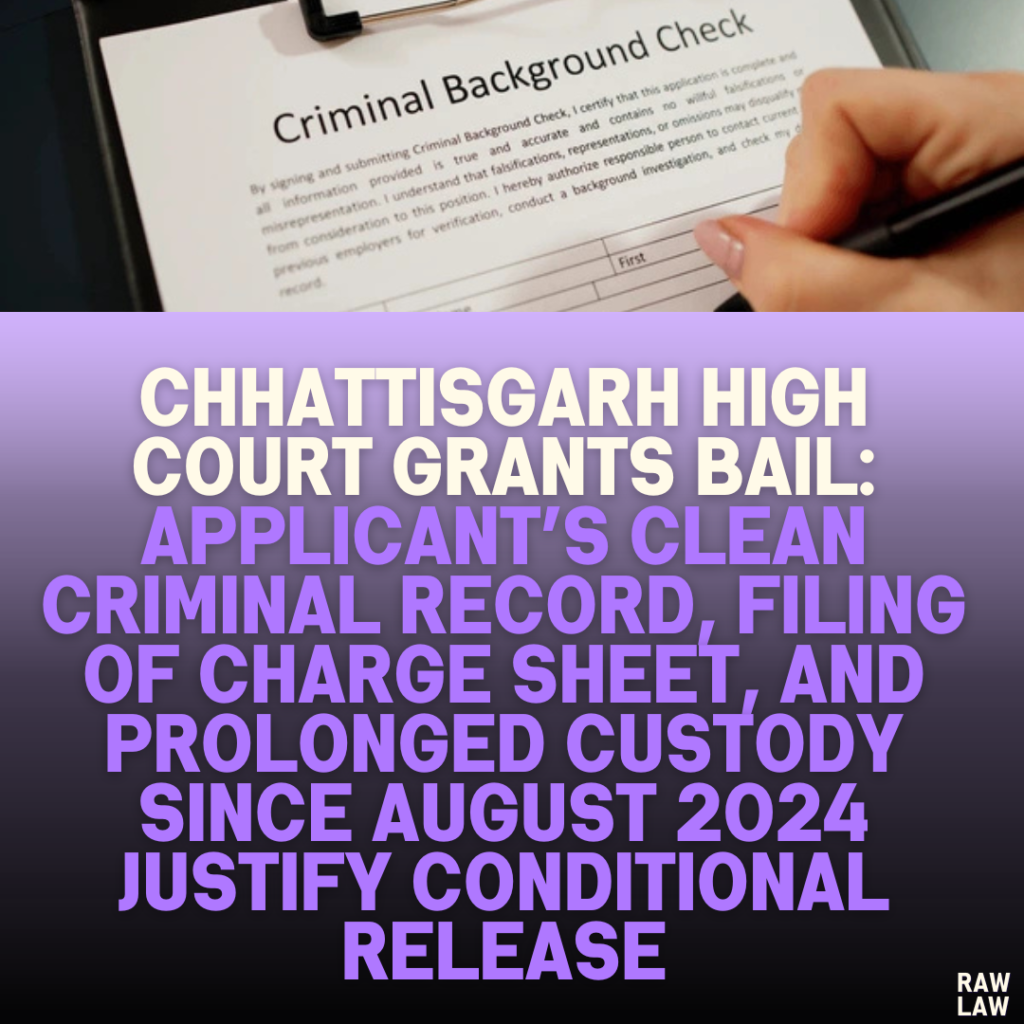Court’s Decision
The High Court of Chhattisgarh allowed the applicant’s bail application under strict conditions, citing the absence of criminal antecedents, the completion of the charge sheet, and the prolonged nature of the trial as significant factors. The court emphasized that releasing the applicant on bail would not adversely affect the trial process if the prescribed conditions were met.
Facts
- Incident Description:
- The complainant alleged that the applicant, along with a juvenile co-accused, assaulted the complainant’s uncle near a temple.
- The altercation occurred after the victim refused to leave the temple premises, leading to a brawl during which the victim suffered grievous injuries, including a possible threat to his eyesight.
- Legal Framework:
- The First Information Report (FIR) was registered under multiple sections of the Bharatiya Nyaya Sanhita (BNS), 2023, including Sections 296, 115(2), 351(2), 117(3), and 3(5), along with Sections 294, 323, 506, and 34 of the Indian Penal Code (IPC).
- Custody:
- The applicant had been in judicial custody since August 21, 2024.
- Co-Accused:
- The juvenile co-accused had already been granted bail by the Judicial Magistrate First Class on August 24, 2024.
Issues
- Entitlement to Bail:
- Should bail be granted in light of the grievous injuries inflicted on the victim?
- Would the applicant’s lack of prior criminal antecedents justify bail despite the severity of allegations?
- Trial Proceedings:
- Can the applicant’s prolonged custody and the expected length of the trial support the decision to grant bail?
Petitioner’s Arguments
- False Implication:
- The applicant argued that he was falsely implicated in the case and denied the allegations.
- Parity with Co-Accused:
- The applicant highlighted that the co-accused, a juvenile, had already been granted bail.
- No Prior Record:
- The applicant had no criminal history, and the charge sheet had been filed, indicating the investigation was complete.
- Trial Duration:
- The applicant emphasized that the trial would likely take a considerable amount of time, making continued custody unjustifiable.
Respondent’s Arguments
- Opposition to Bail:
- The State opposed the bail application, pointing to the severity of the injuries sustained by the victim, particularly the potential loss of eyesight.
- Public Safety Concerns:
- The State contended that the applicant’s release might disrupt the trial or endanger public order.
Analysis of the Law
The court considered the following legal principles:
- Presumption of Innocence:
- Bail serves as a measure to ensure liberty unless proven guilty. Pre-trial detention should not be punitive.
- Gravity of the Offense vs. Applicant’s Rights:
- While the offense involved grievous injuries, the applicant’s lack of prior convictions and completed investigation reduced the risk of obstruction to justice.
- Conditions of Bail under BNS, 2023:
- Sections 269, 84, and 209 of the Bharatiya Nyaya Sanhita provide mechanisms to ensure the applicant’s compliance with trial procedures.
Precedent Analysis
While no explicit references were made to prior judgments, the court followed established principles:
- Bail should balance the presumption of innocence with the gravity of the offense.
- Absence of criminal antecedents is a strong factor in favor of granting bail.
- Prolonged custody without significant trial progress is unjust.
Court’s Reasoning
- Assessment of Circumstances:
- The court considered the applicant’s clean criminal record, the filing of the charge sheet, and the applicant’s custody since August 2024.
- Trial Duration:
- The court acknowledged that the trial’s conclusion was not imminent, making prolonged detention unwarranted.
- Conditional Bail:
- To address concerns about trial disruption, the court imposed stringent conditions to ensure compliance and mitigate risks.
Conclusion
The court granted bail to the applicant under the following conditions:
- No Adjournments:
- The applicant must not seek adjournments when witnesses are present.
- Mandatory Attendance:
- The applicant must attend all trial dates, either personally or through counsel.
- Proclamation Compliance:
- The applicant must comply with summons and proclamations issued by the court.
- Presence at Key Stages:
- The applicant must appear in person at critical trial stages, including case opening, charge framing, and statement recording.
- Misuse of Bail:
- Any misuse of bail or absence without sufficient cause would result in legal consequences under Sections 269, 84, and 209 of the BNS.
Implications
- Precedent for Bail Applications:
- This decision underscores that bail should not serve as a punitive measure, particularly for first-time offenders.
- Emphasis on Trial Participation:
- The stringent conditions reinforce the judiciary’s commitment to balancing individual liberty with the integrity of the trial process.
- Application of BNS, 2023:
- The decision highlights the implementation of procedural safeguards under the new Bharatiya Nyaya Sanhita.



